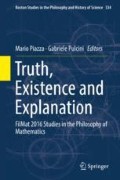Abstract
Do mathematical expressions have intensions, or merely extensions? If we accept the standard account of intensions based on possible worlds, it would seem that the latter is the case – there is no room for nontrivial intensions in the case of non-empirical expressions. However, some vexing mathematical problems, notably Gödel’s Second Incompleteness Theorem, seem to presuppose an intensional construal of some mathematical expressions. Hence, can we make room for intensions in mathematics? In this paper we argue that this is possible, provided we give up the standard approach to intensionality based on possible worlds.
Access this chapter
Tax calculation will be finalised at checkout
Purchases are for personal use only
Notes
- 1.
Well, perhaps it says, over and above this, that there is one and only one tallest bald man; however, this again does not seem to be too nontrivial.
- 2.
- 3.
This is quite obvious if, instead of PrfR, we use still another predicate, namely PrfC(x, y) ≡Def. Prf(x, y) ∧ ¬Prf(x, ⌈0=1⌉). Given Prf(x, ⌈0=1⌉) for no x, PrfC(x, y) holds for the same x’s and y’s as Prf (x, y); while ¬∃xPrfC(x, ⌈0=1⌉) is ¬∃x(Prf(x, ⌈0=1⌉) ∧ ¬Prf(x, ⌈0=1⌉)), which is obviously provable. In fact, if we consider a further modified version of PrfC(x, y), Prf\(_{ {\mathrm{C'}}}\)(x, y) ≡Def. Prf(x, y) ∧ ∀x¬Prf(x, ⌈0=1⌉), we may return to our example (1*) vs. (2*), for we may think of (1*) as roughly capturing the sense of the standard consistency sentence based on the predicate Prf, and of (2*) as capturing that of its variant based on Prf\(_{ {\mathrm{C'}}}\) – for ∀x¬Prf(x, ⌈0=1⌉) clearly amounts to the consistency of PA. (Cf. Auerbach 1992).
- 4.
We may think about a “non-intensional” content of the Second Incompleteness Theorem: for example we may take it as saying that we cannot prove Pr(⌈0 = 1⌉) for any predicate Pr fulfilling Löb’s derivability conditions (Löb 1955; cf. also the thorough discussion of Boolos 1995). But then the question is why this result should be very interesting; unless we show that there is a reason to think that fulfilling Löb’s conditions amounts to being the provability predicate, it is a far cry from what is usually taken as the Second Incompleteness Theorem (see Detlefsen 1986).
- 5.
Put forward by Montague (1974) and others.
- 6.
This is an oversimplification; technically, the systems of intensional logic tend to be somewhat more complicated. See Peregrin (2006).
- 7.
See Peregrin (2014, Chapter 7).
- 8.
I discussed this in great detail in Peregrin (1995).
- 9.
To be sure, there may be expressions, especially definite descriptions, that have an intension but do not have an extension – in the case of mathematical expressions an example might be the greatest prime. But this is because they are composed out of meaningful subexpressions in such a way that they are themselves meaningful, though they do not pick up any extension.
- 10.
See Peregrin (2014).
References
Auerbach, D. 1985. Intensionality and the Gödel theorems. Philosophical Studies 48: 337–351.
Auerbach, D. 1992. How to say things with formalisms. In Proof, logic and formalization, ed. M. Detlefsen, 77–93. London: Routledge.
Bigelow, J.C. 1978. Believing in semantics. Linguistics and Philosophy 2: 101–144.
Boolos, G. 1995. The logic of provability. Cambridge: Cambridge University Press.
Carnap, R. 1947. Meaning and necessity. Chicago: University of Chicago Press.
Cresswell, M.J. 1975. Hyperintensional logic. Studia Logica 35: 25–38.
Detlefsen, M. 1986. Hilbert’s program: An essay on mathematical instrumentalism. Dordrecht: Reidel.
Feferman, S. 1960. Arithmetization of metamathematics in a general setting. Fundamenta Mathematicae 49: 35–92.
Frege, G. 1892a. Über Sinn und bedeutung. Zeitschrift für Philosophie und philosophische Kritik 100: 25–50.
Frege, G. 1892b. Über Begriff und Gegenstand. Vierteljahrschrift für wissentschaftliche Philosophie 16: 192–205.
Halbach, V., and A. Visser. 2014a. Self-reference in arithmetic I. The Review of Symbolic Logic 7: 671–691.
Halbach, V., and A. Visser. 2014b. Self-reference in arithmetic II. The Review of Symbolic Logic 7: 692–712.
Hintikka, J. 1975. Impossible possible worlds vindicated. Journal of Philosophical Logic 4: 475–484.
Kripke, S. 1963a. Semantical considerations on modal logic. Acta Philosophica Fennica 16: 83–94.
Kripke, S. 1963b. Semantical analysis of modal logic I (normal modal propositional calculi). Zeitschift für mathematische Logik und Grundlagen der Mathematik 9: 67–96.
Kripke, S. 1965. Semantical analysis of modal logic II (non-normal modal propositional calculi). In The theory of models, eds. L. Henkin, J.W. Addison, and A. Tarski, 206–220. Amsterdam: North-Holland.
Kripke, S. 1972. Naming and necessity. In Semantics of natural language, eds. D. Davidson, and G. Harman, 253–355. Dordrecht: Reidel. Later published as a book.
Lewis, D. 1972. General semantics. In Semantics of natural language, ed. D. Davidson, and G. Harman, 169–218. Dordrecht: Reidel.
Löb, M. 1955. Solution of a problem of Leon Henkin. The Journal of Symbolic Logic 20: 115–118.
Montague, R. 1974. Formal philosophy: Selected papers of R. Montague. New Haven: Yale University Press.
Partee, B. 1982. Belief sentences and limits of semantics. In Processes, beliefs and questions, ed. S. Peters, and E. Saarinen, 87–106. Dordrecht: Reidel.
Peregrin, J. 1995. Doing worlds with words. Dordrecht: Kluwer.
Peregrin, J. 2006. Extensional vs. intensional logic. In Philosophy of logic, Handbook of the philosophy of science, vol. 5, ed. D. Jacquette, 831–860. Amsterdam: Elsevier.
Peregrin, J. 2014. Inferentialism: Why rules matter. Basingstoke: Palgrave.
Rosser, J.B. 1936. Extensions of some theorems of Göde and Church. Journal of Symbolic Logic 1: 87–91.
Acknowledgements
Work on this paper was supported by Grant No. 17-15645S of the Czech Science Foundation.
Author information
Authors and Affiliations
Corresponding author
Editor information
Editors and Affiliations
Rights and permissions
Copyright information
© 2018 Springer International Publishing AG, part of Springer Nature
About this chapter
Cite this chapter
Peregrin, J. (2018). Intensionality in Mathematics. In: Piazza, M., Pulcini, G. (eds) Truth, Existence and Explanation. Boston Studies in the Philosophy and History of Science, vol 334. Springer, Cham. https://doi.org/10.1007/978-3-319-93342-9_4
Download citation
DOI: https://doi.org/10.1007/978-3-319-93342-9_4
Published:
Publisher Name: Springer, Cham
Print ISBN: 978-3-319-93341-2
Online ISBN: 978-3-319-93342-9
eBook Packages: Religion and PhilosophyPhilosophy and Religion (R0)

